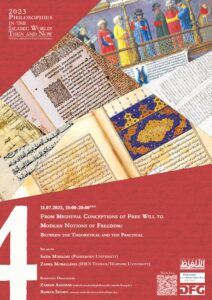From Medieval Conceptions of Free Will to Modern Notions of Freedom: Between the Theoretical and the Practical. Lecture by Saida Mirsadri and Zahra Mobalegh
von:
On July, 11th, 6pm the scholarly Networks LOGOS+ and the Colloquium for Philosophy in the MENA-Region are hosting an online talk by Dr. Saida Mirsadri (Paderborn) and Prof. Zahra Mobalegh (IHCS Tehran, Harvard) as part of the collaborative lecture series “Philosophies in the Islamic World: Then and Now”.
The question of whether human actions are free or determined is of central importance in many intellectual traditions and epochs. They also play an important role in Islamic intellectual history from the 8th century to the present. Already in early kalām-debates this proved to be a controversial problem and, since then, has been developed within the competing doctrines of Islamic Theology (kalām), Sufism and Philosophy. These debates, however, have mostly focused on the problem from a theoretical perspective and have been less concerned with its immediate significance for the development of ethical theories or political philosophy. In contrast, debates over modern concepts of freedom are largely inspired by the diverse reception of European philosophy by thinkers in the Islamic world from the 19th century onwards, and are particularly interested in the elaboration of notions of political freedom and its preconditions. They have done so, however, at the neglect of the long-lasting discussion on free will.
This panel aims at bringing aspects of these two debates into dialogue. As a first step, we wish to consider the question of the extent to which theoretical debates within Islamic philosophy may also be read in the light of ethics and political philosophy. In the first presentation of this panel, Zahra Mobalegh will discuss this issue with a particular focus on the Ishrāqī tradition. In the second presentation, Saida Mirsadri will present some aspects of the discussion about the notion of freedom in the thought of an eminent modern Muslim thinker, who was familiar with both the modern western philosophical tradition and Islamic philosophy: Muhammad Iqbal. In the following discussion the organizers of the panel and guests will hold a conversation on the dialectic relations between the notions of predestination and free will and modern concepts of freedom.
Prof. Zahra Moballegh (Teheran) is an assistant professor of philosophy and intercultural studies at the Institute for humanities and cultural studies, Iran. Her areas of focus are metaphysics, Islamic studies, and feminist philosophy. Her book on feminist theologies, “Faith as Reason: An Epistemological Approach to Feminist Theology ” was the first authored book in this field in Persian. In 2019 she published “Logical Structure of Illuminative Philosophies’” which is a reconstruction of the Ishrāqī ontological system from a contemporary perspective. In most of her works, Dr. Moballegh seeks the question of the relation between practical and theoretical philosophy, and she challenges the historical authenticity of this metaphysical separation through critical re-readings of the classic philosophical texts. Most of her publications are devoted to this critical reading of the texts. During a ten-year career as a faculty member at the encyclopedia of the world of Islam, Zahra Moballegh has written entries on Islamic ethics and theology. She is now working on her idea of a narrative Islamic theology that is the continuation of her research project for Harvard Divinity School, when she joined the program on Women Studies in Religion, 2018- 19.
Dr. Saida Mirsadri (Paderborn) (also spelled Seyedeh Saeideh Mir Sadri) did her masters and PhD in philosophy of religion at the University of Tehran, Iran. Since 2021, she has been a research associate at the University of Paderborn, Germany. She was a guest lecturer at the University of Zürich in the winter semester 2022. Her research interests are modern Islam, Muhammad Iqbal, the problem of evil, process theology and ecotheology. Amongts her latest publications are Beyond Evil, Facing Suffering; Reconstructing Islamic Theodicy by Deconstructing Tradition, Taha Publication, Iran, 2022 (in Persian), “Iqbal’s Process Worldview: Toward a New Islamic Understanding of Divine Action”, in Divine Action; Challenges for Muslim and Christian Theology, edited by John Sanders and Klaus von Stosch, Brill 2022, and “Reading Iqbal in the Light of Kierkegaard; towards an Existentialist Approach to Islam”, coauthored with Mansour Nasiri, in Philosophy East and West 71 (2):414-430 (2021).
Date and Time: July, 11th, 6pm
Venue: Zoom
Please consult the flyer and the provided links for more information on other talks in this series.

